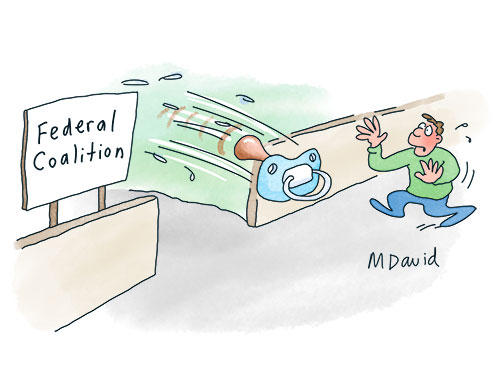If your business relies on ripping off staff, taxpayers and other assorted bystanders – or needs to prevent public access to affordable life-saving medication – in order to stay afloat, it should just close down, writes managing editor Michelle Pini.
IN LATEST NEWS, Alan Joyce will walk away from the airline he has all but destroyed, an even richer man.
The Pharmacy Guild of Australia is taking its fight against 60-day prescriptions all the way to Parliament, because cheaper medicines for you, mean slightly less obscene profits for wealthy pharmacists.
And, celebrity chef George Calombaris, who happened to accidentally misappropriate $8-odd million in wages from his staff, still remains on TV.
We live in a free market economy. Anyone can and should be able to start a business and make money. This is not about stifling entrepreneurialism. Neither is it about governments infringing upon anyone’s liberties.
But if your business model cannot be sustained without any or all of the following:
- gaming the system in order to sack thousands of workers and gift obscene bonuses to bosses;
- ongoing sizable government assistance;
- the misappropriation of employee wages (note well the case of Calombaris);
- the ability to pay proper employee wages at all, in fact; or
- the need to force the elderly, infirm and the impoverished to visit your stores to “help” them part with even more money for items they really don’t need,
then it’s a shit business model.
Basically, if your business relies on ripping off staff, taxpayers and other assorted bystanders in order to stay afloat, it should just close down.
FOODIE RORTERS
George Calombaris’ hospitality empire paid back the $7.8 million in wages and superannuation he owed to his 500 employees. And although he was fined $200,000 — a sum his staff are unlikely to earn in six full years of work – he avoided prison.
As we reported at the time, Calombaris had also:
'...led the posse on the destruction of penalty rates — a campaign the Coalition Government endorsed with relish, slashing the wages of the already lowly-paid by around 15 per cent for hospitality staff at an estimated overall cost to workers of $2.87 billion.'
In 2017, Calombaris was convicted of assaulting a 19-year-old at a soccer match.
Nonetheless, Calombaris made a TV comeback in November last year with a new food program, Hungry. Despite the show bombing in the ratings, we can all still see him on streaming services, as IA recently discovered.
After all, in the world of show-biz and high-flying restaurateurs, what's $8-odd million between workers subsisting below the bread line and their rich bosses, or an assault in a public venue, for that matter?
FLYING THIEVES
Still in the world of high-flyers, outgoing Qantas CEO Alan Joyce was severely slapped with a damp, wilting lettuce leaf as he faced Senate Estimates, this week, over the Airline's lack of customer service, his personal salary and allegations of political perks.
To summarise, Joyce's glittering career leading the company included such highlights as:
- Qantas receiving around $2.7 billion in taxpayer handouts during the pandemic;
- but still posting a massive increase in revenue;
- sacking over 6,000 employees, anyway, and fighting improved conditions for remaining staff by implementing cut-price contracts;
- bungling flight schedules, losing everyone’s luggage and constantly leaving Australians stranded;
- earning Qantas the Choice "Shonky" award for being "the Spirit of Disappointment"; and
- a personal windfall for Joyce, which will see him walking away with approximately $24 million.
Because, in the world of corporate CEOs, an inability to manage the day-to-day company business, combined with rorting taxpayers and firing employees are all just an average day's work.
DRUG LORDS
In other news, the Albanese Government has introduced a new 60-day prescription dispensing system to ease pressures on sufferers of chronic illness — and this makes the Pharmacy Guild extremely unhappy.
Under the new PBS 60-day dispensing system, patients with chronic illnesses can access medicines for a two-month period with a single prescription instead of two separate ones. This will free up GP appointments, save money (an estimated $1.2 billion), as well as time spent accessing life-saving medications, and improve quality of life for many long-term disease sufferers.
The legislation for cheaper medicines – first proposed by Labor five years ago but shot down by the Coalition and One Nation, then and now – has been welcomed by the Medical Association and many consumer groups.
According to Consumer Health Forum CEO Elizabeth Deveny:
The bottom line is that 60-day scripts are good for the health of Australians, as well as their hip pocket.
Increasing the ability for an estimated 11 million consumers with chronic conditions to get a 60-day supply of their medicines, instead of a 30-day supply, effectively halves the cost of their medicines each time they visit the pharmacy.
But those are not the only benefits, continues the Health Forum boss:
...Consumers will also save time and travel costs. This is especially important for consumers who live in rural and remote communities who often have to travel hundreds of kilometres to the nearest pharmacy.
Nonetheless, earlier this year, Pharmacy Guild president Trent Twomey cried on national television over these changes. According to Twomey – even before the move was implemented – it somehow had already caused two pharmacies to go under.
Perhaps, because he was (literally) crying poor at the time, Twomey somehow neglected to mention the peak body’s earlier admission about pharmacy profits. That these actually increased during the COVID crisis or that many of those businesses with boosted profits still pocketed JobKeeper payments.
Or that those profits enjoyed by Guild members are already heavily subsidised by a vast raft of government handouts and protections gifted to the industry since time immemorial, of which JobKeeper is only the latest incarnation.
Gratuitous gifts aside, also missing from tearful Twomey's ongoing campaign to stop people from saving money on life-saving medications, is the Government's assurance to the Guild that any savings through the removal of the second dispensing fee will be invested directly back into pharmacies.
As Minister for Health Mark Butler said:
'...Every dollar that the Commonwealth will save from this measure will be reinvested back into new spending on community pharmacy programs.'
Nonetheless, the ongoing campaign by the Pharmacy Guild to force the chronically ill to pay more for medicines includes advertising centred around the question 'How will it cost you?', a petition, a Canberra rally and a call for members (who already pay fees to the powerful industry body) to 'chip in $500'.
Perplexingly, Twomey’s cause was still taken up by the Coalition and Pauline Hanson’s One Nation, who unsuccessfully attempted to vote down the proposed changes this month in the Senate.
Australian Medical Association president Professor Steve Robson said:
"Affordable medication should be available to every single Australian. It’s that simple.
...The Coalition yesterday showed they do not feel the same way."
And so, these are just a few recent examples of why we can’t have nice things — like restaurant meals, plane trips, or life-saving medications. Well, apart from the rich and powerful, like the Pharmacy Guild and other corporate rent-dodgers. In the opinion of IA, no matter how pitiful the haughty rich may regard us, we are just as entitled to not die before our time nor suffer inordinate pain doing so.
This editorial was originally published as part of the Independent Australia weekly newsletter – usually only available to subscribers – and may be read online in the IA members-only area.
You can follow& Michelle Pini on Twitter @vmp9 and Independent Australia on Twitter @independentaus, Facebook HERE and Instagram HERE.
 This work is licensed under a Creative Commons Attribution-NonCommercial-NoDerivs 3.0 Australia License
This work is licensed under a Creative Commons Attribution-NonCommercial-NoDerivs 3.0 Australia License
Support independent journalism Subscribe to IA.














